Best Practices: Strategic Planning for SMEs in GCC Research Proposal
VerifiedAdded on 2022/12/23
|18
|4189
|1
Project
AI Summary
This research proposal focuses on identifying the best strategic planning practices for small and medium enterprises (SMEs) operating within the Gulf Cooperation Council (GCC) region, with a specific emphasis on Qatar, given the volatile and uncertain business climate. The study acknowledges the challenges faced by SMEs in the GCC, such as supply chain disruptions, employee turnover, and risk management. It aims to investigate how effective strategic planning can improve supply chain operations, enhance inventory management, reduce job turnover, and improve risk management performance. The research will employ both qualitative and quantitative methods, including semi-structured interviews with SME managers and surveys of various companies. The proposal seeks to answer key research questions regarding the challenges faced by GCC SMEs, the best strategic planning practices, and how effective planning can enable SMEs to sustain growth and mitigate risks. The research will analyze the role of strategic planning in the success of SMEs, considering factors like market fluctuations, competition, and the need for flexible strategies to adapt to rapid changes. The study will also explore the application of various strategic planning tools and theories, such as SWOT analysis, Porter's five forces, and PESTLE analysis, to understand their impact on SME performance. Ultimately, the research aims to provide insights and recommendations to help SMEs in the GCC, particularly in Qatar, to thrive in a dynamic and competitive environment.
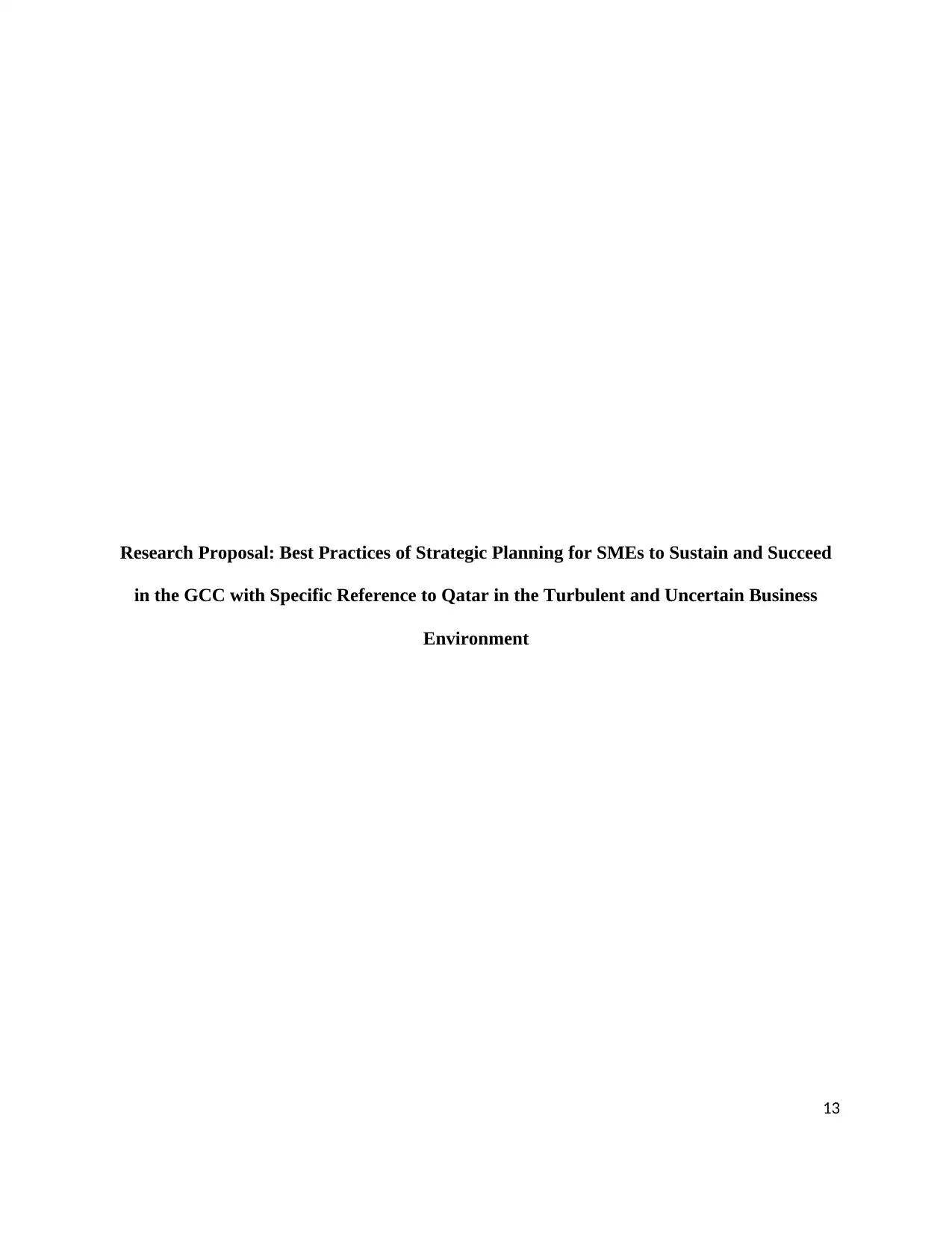
Research Proposal: Best Practices of Strategic Planning for SMEs to Sustain and Succeed
in the GCC with Specific Reference to Qatar in the Turbulent and Uncertain Business
Environment
13
in the GCC with Specific Reference to Qatar in the Turbulent and Uncertain Business
Environment
13
Paraphrase This Document
Need a fresh take? Get an instant paraphrase of this document with our AI Paraphraser
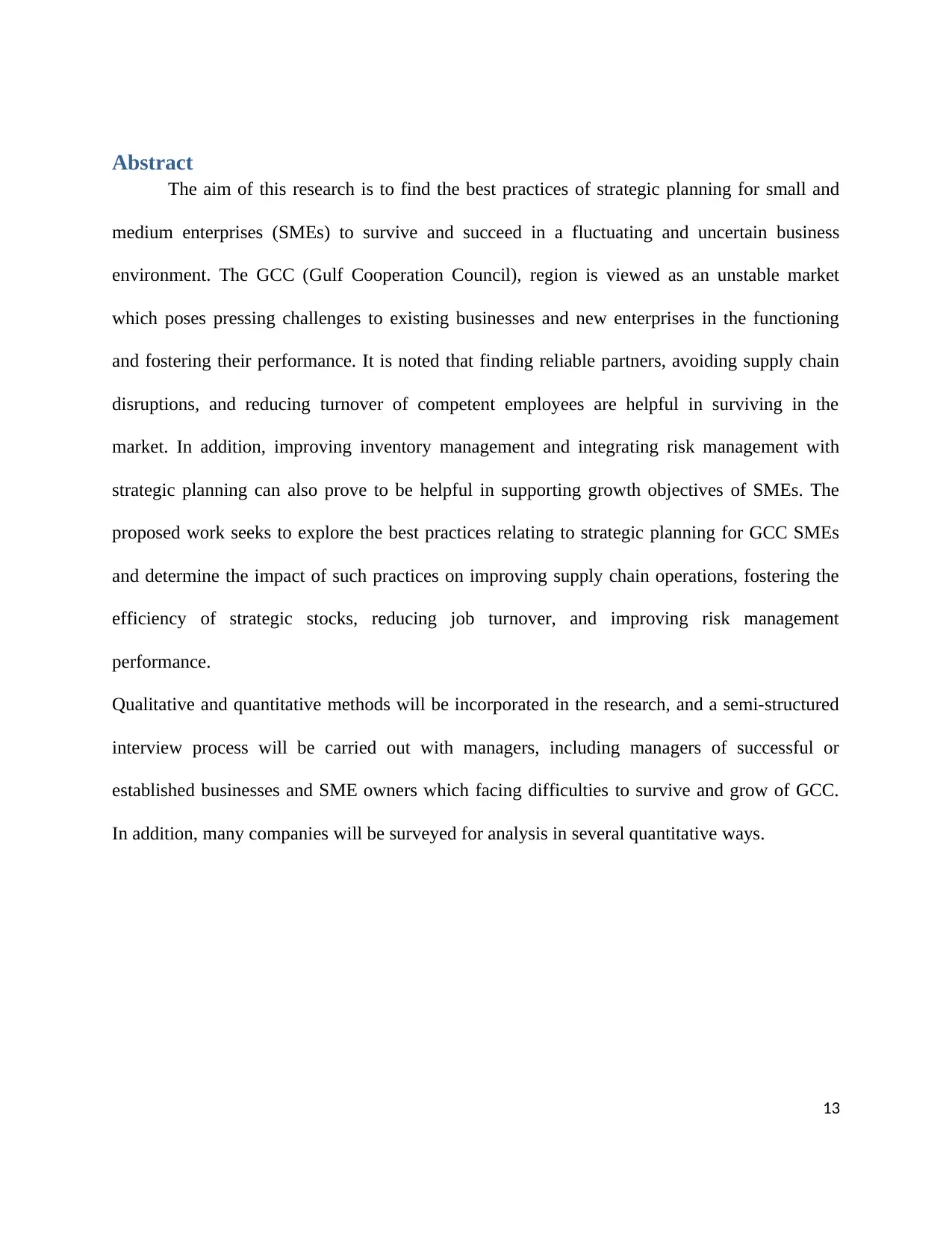
Abstract
The aim of this research is to find the best practices of strategic planning for small and
medium enterprises (SMEs) to survive and succeed in a fluctuating and uncertain business
environment. The GCC (Gulf Cooperation Council), region is viewed as an unstable market
which poses pressing challenges to existing businesses and new enterprises in the functioning
and fostering their performance. It is noted that finding reliable partners, avoiding supply chain
disruptions, and reducing turnover of competent employees are helpful in surviving in the
market. In addition, improving inventory management and integrating risk management with
strategic planning can also prove to be helpful in supporting growth objectives of SMEs. The
proposed work seeks to explore the best practices relating to strategic planning for GCC SMEs
and determine the impact of such practices on improving supply chain operations, fostering the
efficiency of strategic stocks, reducing job turnover, and improving risk management
performance.
Qualitative and quantitative methods will be incorporated in the research, and a semi-structured
interview process will be carried out with managers, including managers of successful or
established businesses and SME owners which facing difficulties to survive and grow of GCC.
In addition, many companies will be surveyed for analysis in several quantitative ways.
13
The aim of this research is to find the best practices of strategic planning for small and
medium enterprises (SMEs) to survive and succeed in a fluctuating and uncertain business
environment. The GCC (Gulf Cooperation Council), region is viewed as an unstable market
which poses pressing challenges to existing businesses and new enterprises in the functioning
and fostering their performance. It is noted that finding reliable partners, avoiding supply chain
disruptions, and reducing turnover of competent employees are helpful in surviving in the
market. In addition, improving inventory management and integrating risk management with
strategic planning can also prove to be helpful in supporting growth objectives of SMEs. The
proposed work seeks to explore the best practices relating to strategic planning for GCC SMEs
and determine the impact of such practices on improving supply chain operations, fostering the
efficiency of strategic stocks, reducing job turnover, and improving risk management
performance.
Qualitative and quantitative methods will be incorporated in the research, and a semi-structured
interview process will be carried out with managers, including managers of successful or
established businesses and SME owners which facing difficulties to survive and grow of GCC.
In addition, many companies will be surveyed for analysis in several quantitative ways.
13
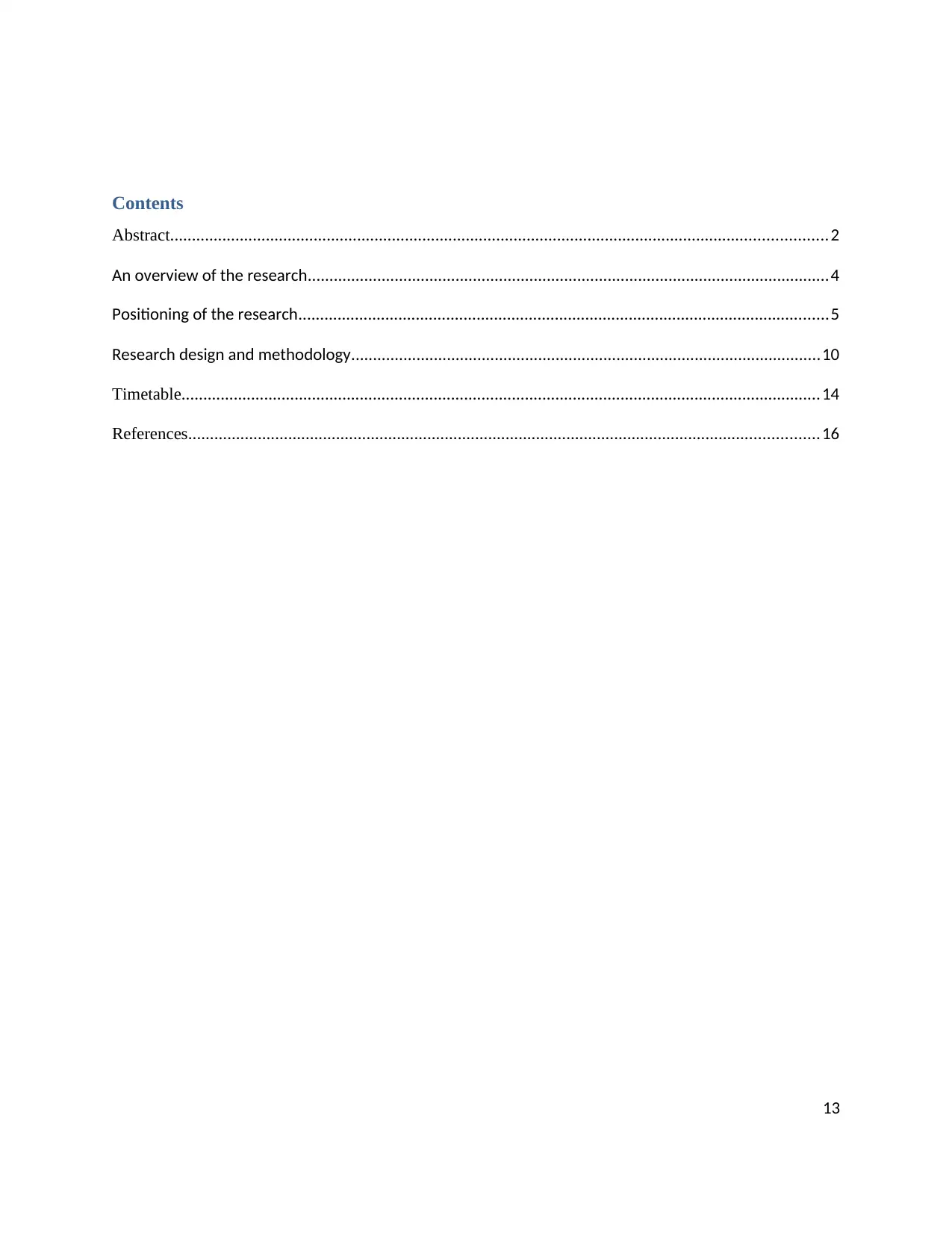
Contents
Abstract.......................................................................................................................................................2
An overview of the research........................................................................................................................4
Positioning of the research..........................................................................................................................5
Research design and methodology............................................................................................................10
Timetable...................................................................................................................................................14
References.................................................................................................................................................16
13
Abstract.......................................................................................................................................................2
An overview of the research........................................................................................................................4
Positioning of the research..........................................................................................................................5
Research design and methodology............................................................................................................10
Timetable...................................................................................................................................................14
References.................................................................................................................................................16
13
⊘ This is a preview!⊘
Do you want full access?
Subscribe today to unlock all pages.

Trusted by 1+ million students worldwide
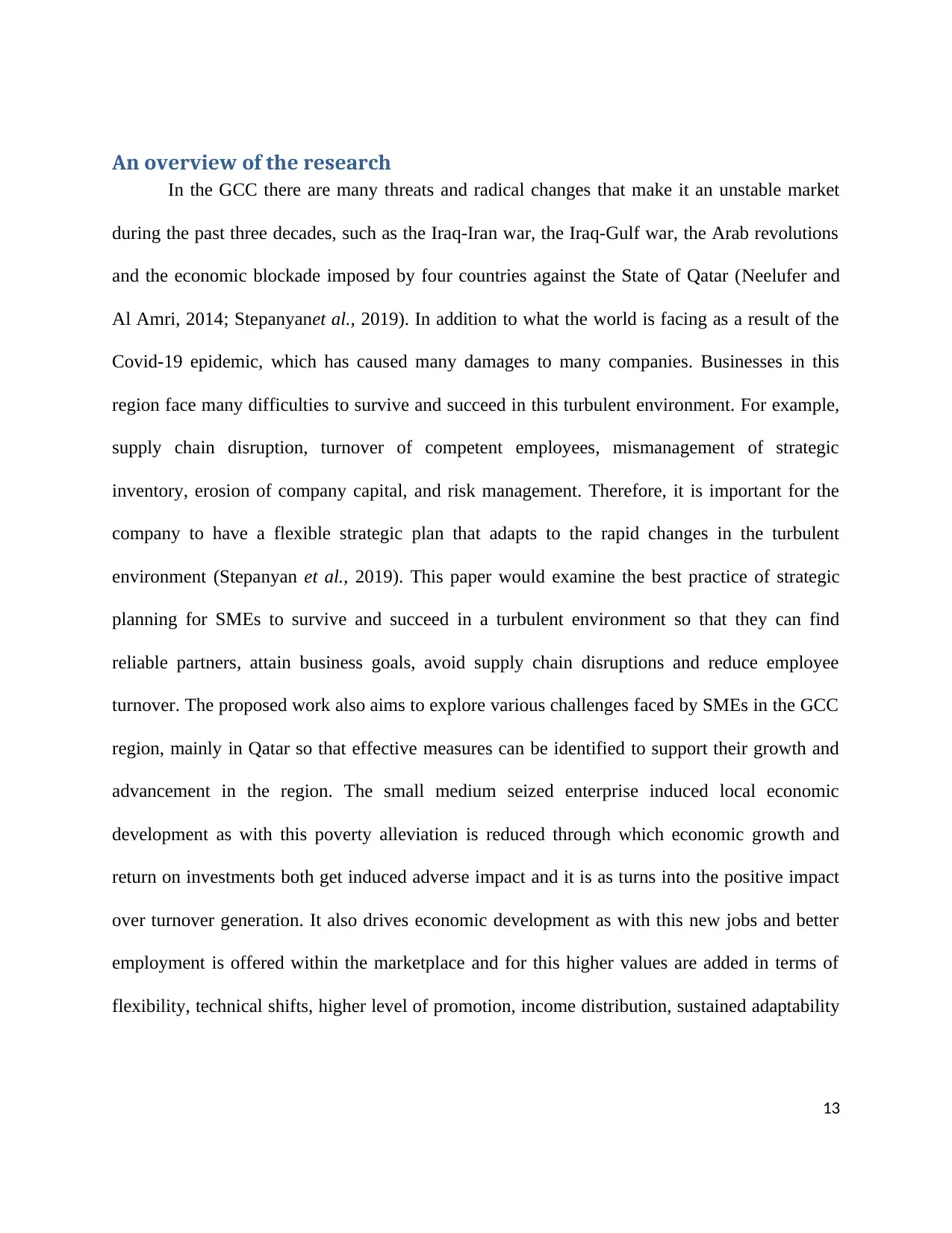
An overview of the research
In the GCC there are many threats and radical changes that make it an unstable market
during the past three decades, such as the Iraq-Iran war, the Iraq-Gulf war, the Arab revolutions
and the economic blockade imposed by four countries against the State of Qatar (Neelufer and
Al Amri, 2014; Stepanyanet al., 2019). In addition to what the world is facing as a result of the
Covid-19 epidemic, which has caused many damages to many companies. Businesses in this
region face many difficulties to survive and succeed in this turbulent environment. For example,
supply chain disruption, turnover of competent employees, mismanagement of strategic
inventory, erosion of company capital, and risk management. Therefore, it is important for the
company to have a flexible strategic plan that adapts to the rapid changes in the turbulent
environment (Stepanyan et al., 2019). This paper would examine the best practice of strategic
planning for SMEs to survive and succeed in a turbulent environment so that they can find
reliable partners, attain business goals, avoid supply chain disruptions and reduce employee
turnover. The proposed work also aims to explore various challenges faced by SMEs in the GCC
region, mainly in Qatar so that effective measures can be identified to support their growth and
advancement in the region. The small medium seized enterprise induced local economic
development as with this poverty alleviation is reduced through which economic growth and
return on investments both get induced adverse impact and it is as turns into the positive impact
over turnover generation. It also drives economic development as with this new jobs and better
employment is offered within the marketplace and for this higher values are added in terms of
flexibility, technical shifts, higher level of promotion, income distribution, sustained adaptability
13
In the GCC there are many threats and radical changes that make it an unstable market
during the past three decades, such as the Iraq-Iran war, the Iraq-Gulf war, the Arab revolutions
and the economic blockade imposed by four countries against the State of Qatar (Neelufer and
Al Amri, 2014; Stepanyanet al., 2019). In addition to what the world is facing as a result of the
Covid-19 epidemic, which has caused many damages to many companies. Businesses in this
region face many difficulties to survive and succeed in this turbulent environment. For example,
supply chain disruption, turnover of competent employees, mismanagement of strategic
inventory, erosion of company capital, and risk management. Therefore, it is important for the
company to have a flexible strategic plan that adapts to the rapid changes in the turbulent
environment (Stepanyan et al., 2019). This paper would examine the best practice of strategic
planning for SMEs to survive and succeed in a turbulent environment so that they can find
reliable partners, attain business goals, avoid supply chain disruptions and reduce employee
turnover. The proposed work also aims to explore various challenges faced by SMEs in the GCC
region, mainly in Qatar so that effective measures can be identified to support their growth and
advancement in the region. The small medium seized enterprise induced local economic
development as with this poverty alleviation is reduced through which economic growth and
return on investments both get induced adverse impact and it is as turns into the positive impact
over turnover generation. It also drives economic development as with this new jobs and better
employment is offered within the marketplace and for this higher values are added in terms of
flexibility, technical shifts, higher level of promotion, income distribution, sustained adaptability
13
Paraphrase This Document
Need a fresh take? Get an instant paraphrase of this document with our AI Paraphraser
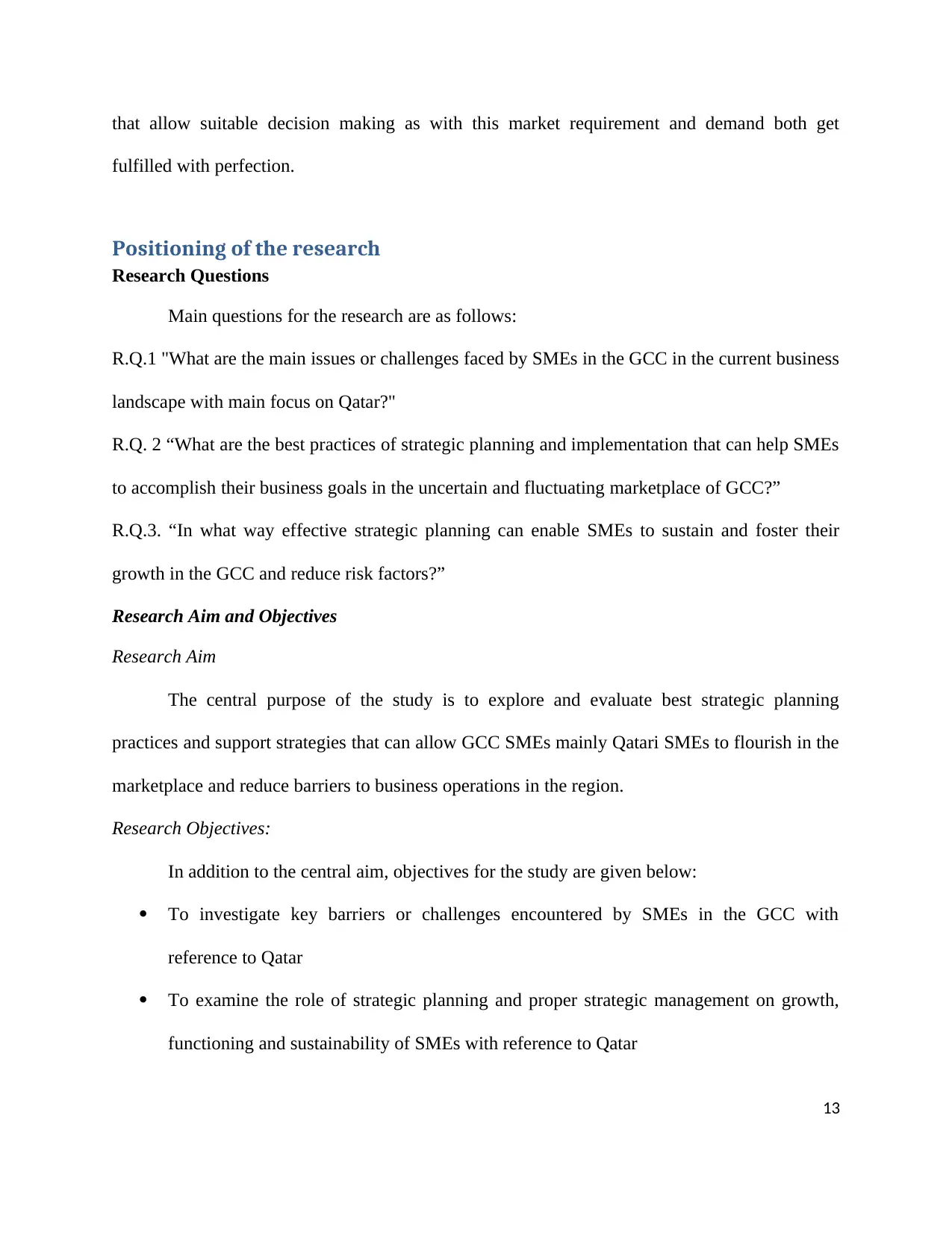
that allow suitable decision making as with this market requirement and demand both get
fulfilled with perfection.
Positioning of the research
Research Questions
Main questions for the research are as follows:
R.Q.1 "What are the main issues or challenges faced by SMEs in the GCC in the current business
landscape with main focus on Qatar?"
R.Q. 2 “What are the best practices of strategic planning and implementation that can help SMEs
to accomplish their business goals in the uncertain and fluctuating marketplace of GCC?”
R.Q.3. “In what way effective strategic planning can enable SMEs to sustain and foster their
growth in the GCC and reduce risk factors?”
Research Aim and Objectives
Research Aim
The central purpose of the study is to explore and evaluate best strategic planning
practices and support strategies that can allow GCC SMEs mainly Qatari SMEs to flourish in the
marketplace and reduce barriers to business operations in the region.
Research Objectives:
In addition to the central aim, objectives for the study are given below:
To investigate key barriers or challenges encountered by SMEs in the GCC with
reference to Qatar
To examine the role of strategic planning and proper strategic management on growth,
functioning and sustainability of SMEs with reference to Qatar
13
fulfilled with perfection.
Positioning of the research
Research Questions
Main questions for the research are as follows:
R.Q.1 "What are the main issues or challenges faced by SMEs in the GCC in the current business
landscape with main focus on Qatar?"
R.Q. 2 “What are the best practices of strategic planning and implementation that can help SMEs
to accomplish their business goals in the uncertain and fluctuating marketplace of GCC?”
R.Q.3. “In what way effective strategic planning can enable SMEs to sustain and foster their
growth in the GCC and reduce risk factors?”
Research Aim and Objectives
Research Aim
The central purpose of the study is to explore and evaluate best strategic planning
practices and support strategies that can allow GCC SMEs mainly Qatari SMEs to flourish in the
marketplace and reduce barriers to business operations in the region.
Research Objectives:
In addition to the central aim, objectives for the study are given below:
To investigate key barriers or challenges encountered by SMEs in the GCC with
reference to Qatar
To examine the role of strategic planning and proper strategic management on growth,
functioning and sustainability of SMEs with reference to Qatar
13
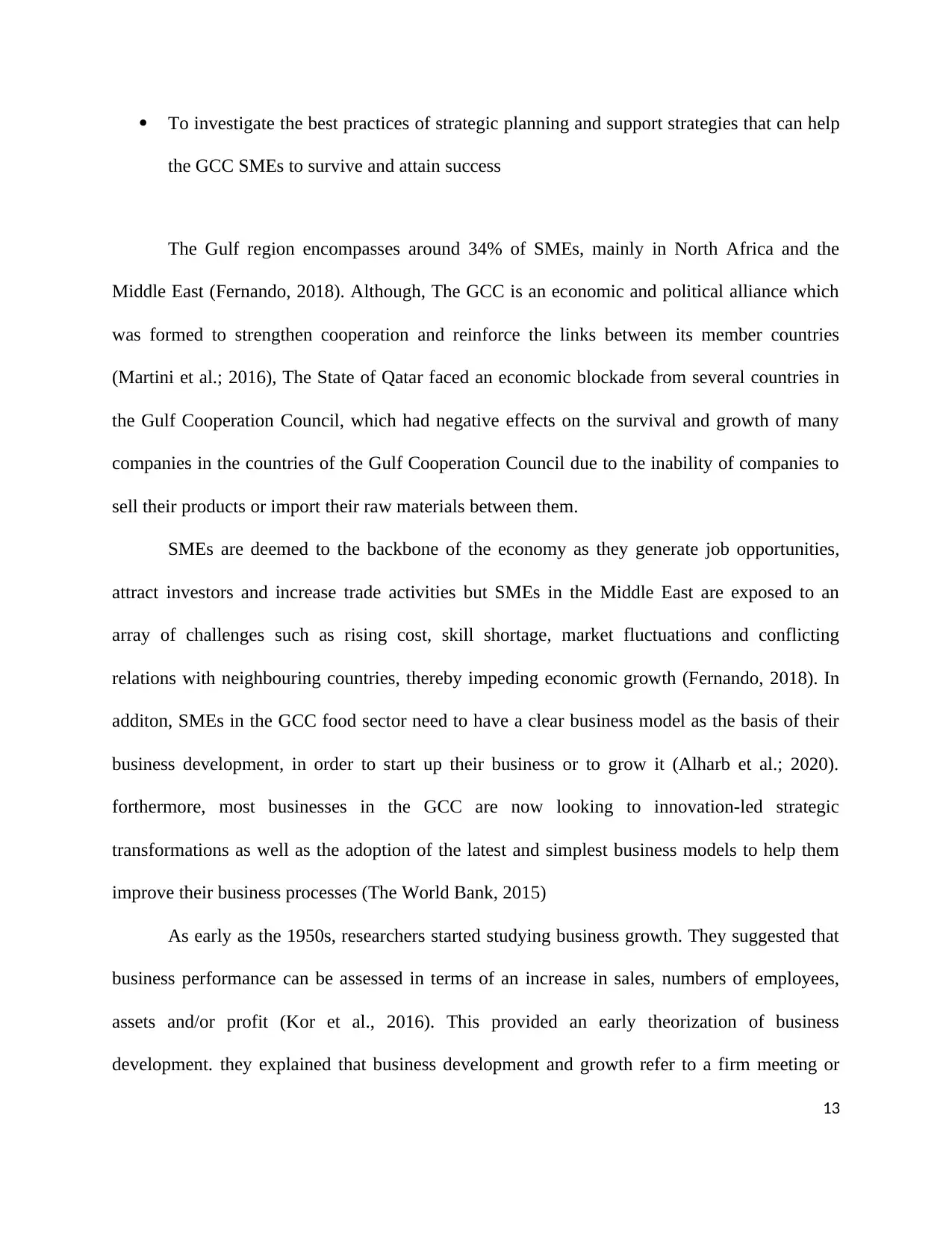
To investigate the best practices of strategic planning and support strategies that can help
the GCC SMEs to survive and attain success
The Gulf region encompasses around 34% of SMEs, mainly in North Africa and the
Middle East (Fernando, 2018). Although, The GCC is an economic and political alliance which
was formed to strengthen cooperation and reinforce the links between its member countries
(Martini et al.; 2016), The State of Qatar faced an economic blockade from several countries in
the Gulf Cooperation Council, which had negative effects on the survival and growth of many
companies in the countries of the Gulf Cooperation Council due to the inability of companies to
sell their products or import their raw materials between them.
SMEs are deemed to the backbone of the economy as they generate job opportunities,
attract investors and increase trade activities but SMEs in the Middle East are exposed to an
array of challenges such as rising cost, skill shortage, market fluctuations and conflicting
relations with neighbouring countries, thereby impeding economic growth (Fernando, 2018). In
additon, SMEs in the GCC food sector need to have a clear business model as the basis of their
business development, in order to start up their business or to grow it (Alharb et al.; 2020).
forthermore, most businesses in the GCC are now looking to innovation-led strategic
transformations as well as the adoption of the latest and simplest business models to help them
improve their business processes (The World Bank, 2015)
As early as the 1950s, researchers started studying business growth. They suggested that
business performance can be assessed in terms of an increase in sales, numbers of employees,
assets and/or profit (Kor et al., 2016). This provided an early theorization of business
development. they explained that business development and growth refer to a firm meeting or
13
the GCC SMEs to survive and attain success
The Gulf region encompasses around 34% of SMEs, mainly in North Africa and the
Middle East (Fernando, 2018). Although, The GCC is an economic and political alliance which
was formed to strengthen cooperation and reinforce the links between its member countries
(Martini et al.; 2016), The State of Qatar faced an economic blockade from several countries in
the Gulf Cooperation Council, which had negative effects on the survival and growth of many
companies in the countries of the Gulf Cooperation Council due to the inability of companies to
sell their products or import their raw materials between them.
SMEs are deemed to the backbone of the economy as they generate job opportunities,
attract investors and increase trade activities but SMEs in the Middle East are exposed to an
array of challenges such as rising cost, skill shortage, market fluctuations and conflicting
relations with neighbouring countries, thereby impeding economic growth (Fernando, 2018). In
additon, SMEs in the GCC food sector need to have a clear business model as the basis of their
business development, in order to start up their business or to grow it (Alharb et al.; 2020).
forthermore, most businesses in the GCC are now looking to innovation-led strategic
transformations as well as the adoption of the latest and simplest business models to help them
improve their business processes (The World Bank, 2015)
As early as the 1950s, researchers started studying business growth. They suggested that
business performance can be assessed in terms of an increase in sales, numbers of employees,
assets and/or profit (Kor et al., 2016). This provided an early theorization of business
development. they explained that business development and growth refer to a firm meeting or
13
⊘ This is a preview!⊘
Do you want full access?
Subscribe today to unlock all pages.

Trusted by 1+ million students worldwide
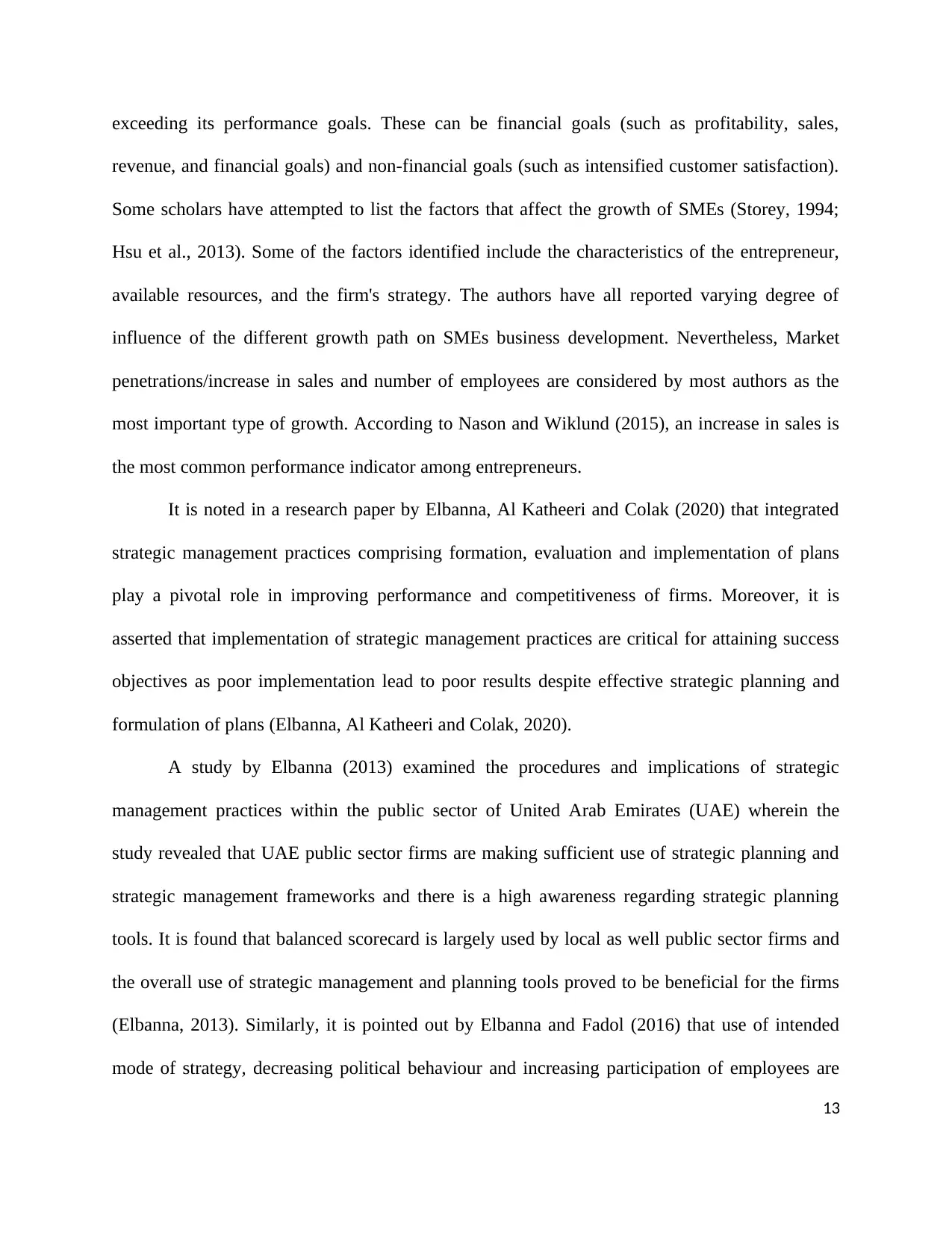
exceeding its performance goals. These can be financial goals (such as profitability, sales,
revenue, and financial goals) and non-financial goals (such as intensified customer satisfaction).
Some scholars have attempted to list the factors that affect the growth of SMEs (Storey, 1994;
Hsu et al., 2013). Some of the factors identified include the characteristics of the entrepreneur,
available resources, and the firm's strategy. The authors have all reported varying degree of
influence of the different growth path on SMEs business development. Nevertheless, Market
penetrations/increase in sales and number of employees are considered by most authors as the
most important type of growth. According to Nason and Wiklund (2015), an increase in sales is
the most common performance indicator among entrepreneurs.
It is noted in a research paper by Elbanna, Al Katheeri and Colak (2020) that integrated
strategic management practices comprising formation, evaluation and implementation of plans
play a pivotal role in improving performance and competitiveness of firms. Moreover, it is
asserted that implementation of strategic management practices are critical for attaining success
objectives as poor implementation lead to poor results despite effective strategic planning and
formulation of plans (Elbanna, Al Katheeri and Colak, 2020).
A study by Elbanna (2013) examined the procedures and implications of strategic
management practices within the public sector of United Arab Emirates (UAE) wherein the
study revealed that UAE public sector firms are making sufficient use of strategic planning and
strategic management frameworks and there is a high awareness regarding strategic planning
tools. It is found that balanced scorecard is largely used by local as well public sector firms and
the overall use of strategic management and planning tools proved to be beneficial for the firms
(Elbanna, 2013). Similarly, it is pointed out by Elbanna and Fadol (2016) that use of intended
mode of strategy, decreasing political behaviour and increasing participation of employees are
13
revenue, and financial goals) and non-financial goals (such as intensified customer satisfaction).
Some scholars have attempted to list the factors that affect the growth of SMEs (Storey, 1994;
Hsu et al., 2013). Some of the factors identified include the characteristics of the entrepreneur,
available resources, and the firm's strategy. The authors have all reported varying degree of
influence of the different growth path on SMEs business development. Nevertheless, Market
penetrations/increase in sales and number of employees are considered by most authors as the
most important type of growth. According to Nason and Wiklund (2015), an increase in sales is
the most common performance indicator among entrepreneurs.
It is noted in a research paper by Elbanna, Al Katheeri and Colak (2020) that integrated
strategic management practices comprising formation, evaluation and implementation of plans
play a pivotal role in improving performance and competitiveness of firms. Moreover, it is
asserted that implementation of strategic management practices are critical for attaining success
objectives as poor implementation lead to poor results despite effective strategic planning and
formulation of plans (Elbanna, Al Katheeri and Colak, 2020).
A study by Elbanna (2013) examined the procedures and implications of strategic
management practices within the public sector of United Arab Emirates (UAE) wherein the
study revealed that UAE public sector firms are making sufficient use of strategic planning and
strategic management frameworks and there is a high awareness regarding strategic planning
tools. It is found that balanced scorecard is largely used by local as well public sector firms and
the overall use of strategic management and planning tools proved to be beneficial for the firms
(Elbanna, 2013). Similarly, it is pointed out by Elbanna and Fadol (2016) that use of intended
mode of strategy, decreasing political behaviour and increasing participation of employees are
13
Paraphrase This Document
Need a fresh take? Get an instant paraphrase of this document with our AI Paraphraser
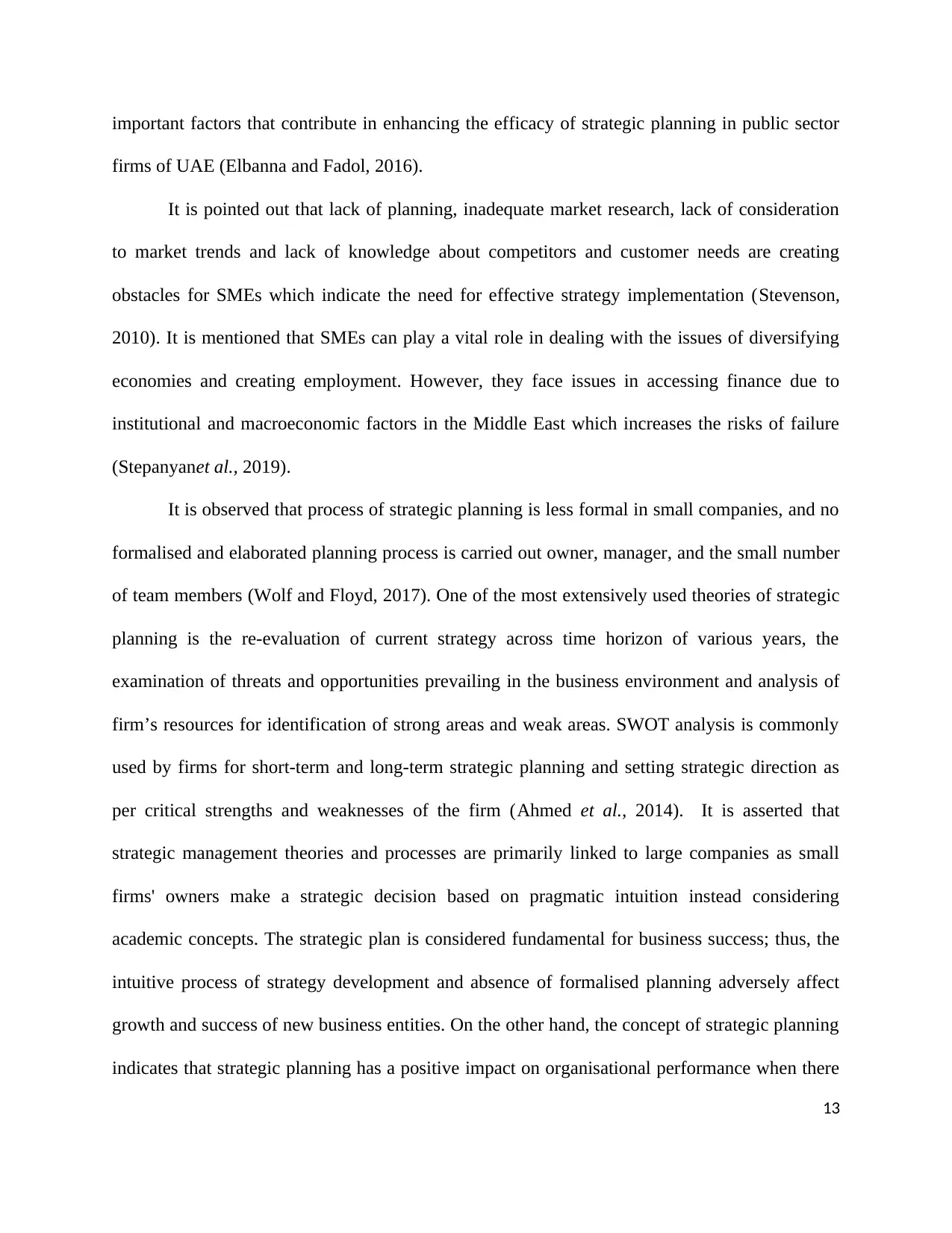
important factors that contribute in enhancing the efficacy of strategic planning in public sector
firms of UAE (Elbanna and Fadol, 2016).
It is pointed out that lack of planning, inadequate market research, lack of consideration
to market trends and lack of knowledge about competitors and customer needs are creating
obstacles for SMEs which indicate the need for effective strategy implementation (Stevenson,
2010). It is mentioned that SMEs can play a vital role in dealing with the issues of diversifying
economies and creating employment. However, they face issues in accessing finance due to
institutional and macroeconomic factors in the Middle East which increases the risks of failure
(Stepanyanet al., 2019).
It is observed that process of strategic planning is less formal in small companies, and no
formalised and elaborated planning process is carried out owner, manager, and the small number
of team members (Wolf and Floyd, 2017). One of the most extensively used theories of strategic
planning is the re-evaluation of current strategy across time horizon of various years, the
examination of threats and opportunities prevailing in the business environment and analysis of
firm’s resources for identification of strong areas and weak areas. SWOT analysis is commonly
used by firms for short-term and long-term strategic planning and setting strategic direction as
per critical strengths and weaknesses of the firm (Ahmed et al., 2014). It is asserted that
strategic management theories and processes are primarily linked to large companies as small
firms' owners make a strategic decision based on pragmatic intuition instead considering
academic concepts. The strategic plan is considered fundamental for business success; thus, the
intuitive process of strategy development and absence of formalised planning adversely affect
growth and success of new business entities. On the other hand, the concept of strategic planning
indicates that strategic planning has a positive impact on organisational performance when there
13
firms of UAE (Elbanna and Fadol, 2016).
It is pointed out that lack of planning, inadequate market research, lack of consideration
to market trends and lack of knowledge about competitors and customer needs are creating
obstacles for SMEs which indicate the need for effective strategy implementation (Stevenson,
2010). It is mentioned that SMEs can play a vital role in dealing with the issues of diversifying
economies and creating employment. However, they face issues in accessing finance due to
institutional and macroeconomic factors in the Middle East which increases the risks of failure
(Stepanyanet al., 2019).
It is observed that process of strategic planning is less formal in small companies, and no
formalised and elaborated planning process is carried out owner, manager, and the small number
of team members (Wolf and Floyd, 2017). One of the most extensively used theories of strategic
planning is the re-evaluation of current strategy across time horizon of various years, the
examination of threats and opportunities prevailing in the business environment and analysis of
firm’s resources for identification of strong areas and weak areas. SWOT analysis is commonly
used by firms for short-term and long-term strategic planning and setting strategic direction as
per critical strengths and weaknesses of the firm (Ahmed et al., 2014). It is asserted that
strategic management theories and processes are primarily linked to large companies as small
firms' owners make a strategic decision based on pragmatic intuition instead considering
academic concepts. The strategic plan is considered fundamental for business success; thus, the
intuitive process of strategy development and absence of formalised planning adversely affect
growth and success of new business entities. On the other hand, the concept of strategic planning
indicates that strategic planning has a positive impact on organisational performance when there
13
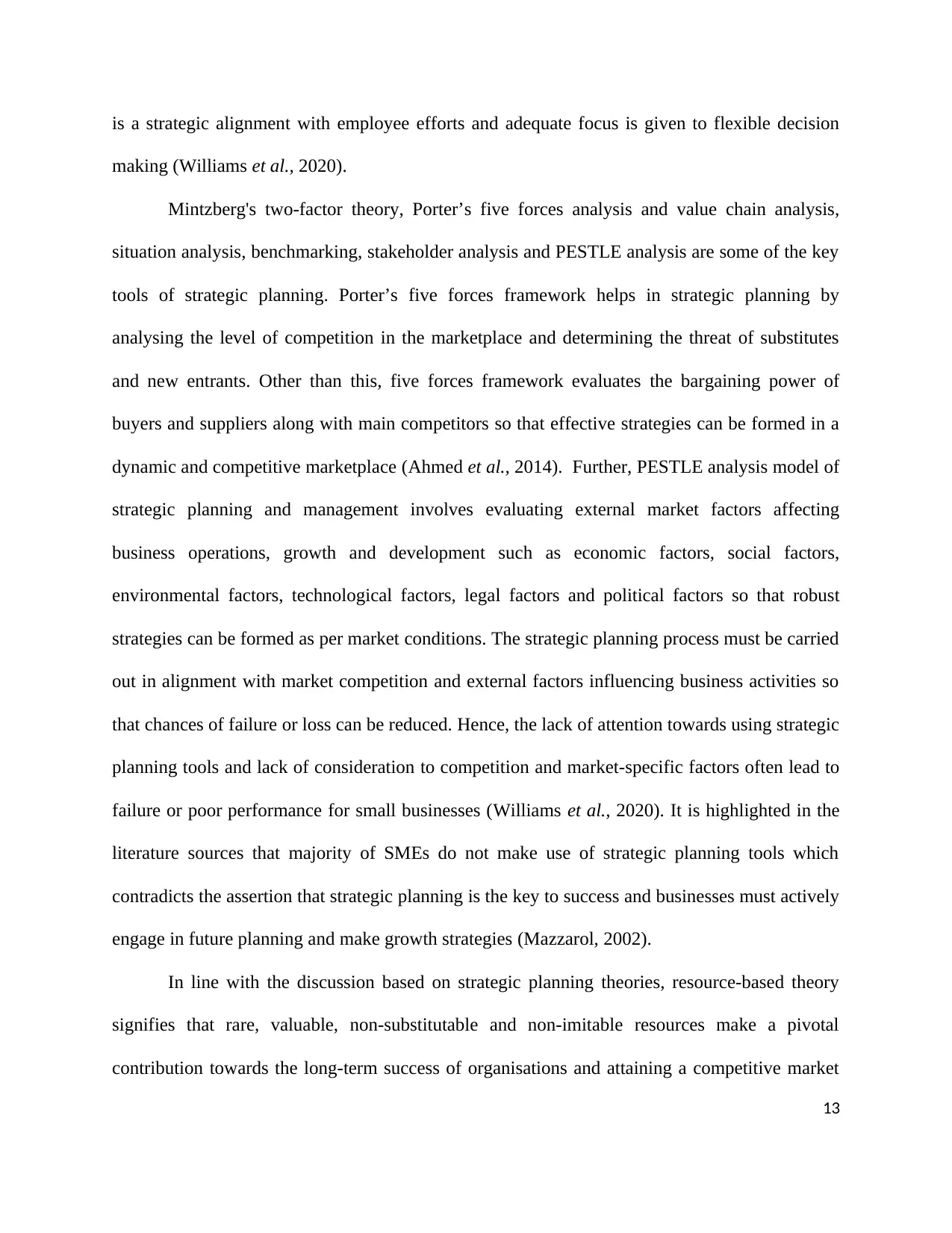
is a strategic alignment with employee efforts and adequate focus is given to flexible decision
making (Williams et al., 2020).
Mintzberg's two-factor theory, Porter’s five forces analysis and value chain analysis,
situation analysis, benchmarking, stakeholder analysis and PESTLE analysis are some of the key
tools of strategic planning. Porter’s five forces framework helps in strategic planning by
analysing the level of competition in the marketplace and determining the threat of substitutes
and new entrants. Other than this, five forces framework evaluates the bargaining power of
buyers and suppliers along with main competitors so that effective strategies can be formed in a
dynamic and competitive marketplace (Ahmed et al., 2014). Further, PESTLE analysis model of
strategic planning and management involves evaluating external market factors affecting
business operations, growth and development such as economic factors, social factors,
environmental factors, technological factors, legal factors and political factors so that robust
strategies can be formed as per market conditions. The strategic planning process must be carried
out in alignment with market competition and external factors influencing business activities so
that chances of failure or loss can be reduced. Hence, the lack of attention towards using strategic
planning tools and lack of consideration to competition and market-specific factors often lead to
failure or poor performance for small businesses (Williams et al., 2020). It is highlighted in the
literature sources that majority of SMEs do not make use of strategic planning tools which
contradicts the assertion that strategic planning is the key to success and businesses must actively
engage in future planning and make growth strategies (Mazzarol, 2002).
In line with the discussion based on strategic planning theories, resource-based theory
signifies that rare, valuable, non-substitutable and non-imitable resources make a pivotal
contribution towards the long-term success of organisations and attaining a competitive market
13
making (Williams et al., 2020).
Mintzberg's two-factor theory, Porter’s five forces analysis and value chain analysis,
situation analysis, benchmarking, stakeholder analysis and PESTLE analysis are some of the key
tools of strategic planning. Porter’s five forces framework helps in strategic planning by
analysing the level of competition in the marketplace and determining the threat of substitutes
and new entrants. Other than this, five forces framework evaluates the bargaining power of
buyers and suppliers along with main competitors so that effective strategies can be formed in a
dynamic and competitive marketplace (Ahmed et al., 2014). Further, PESTLE analysis model of
strategic planning and management involves evaluating external market factors affecting
business operations, growth and development such as economic factors, social factors,
environmental factors, technological factors, legal factors and political factors so that robust
strategies can be formed as per market conditions. The strategic planning process must be carried
out in alignment with market competition and external factors influencing business activities so
that chances of failure or loss can be reduced. Hence, the lack of attention towards using strategic
planning tools and lack of consideration to competition and market-specific factors often lead to
failure or poor performance for small businesses (Williams et al., 2020). It is highlighted in the
literature sources that majority of SMEs do not make use of strategic planning tools which
contradicts the assertion that strategic planning is the key to success and businesses must actively
engage in future planning and make growth strategies (Mazzarol, 2002).
In line with the discussion based on strategic planning theories, resource-based theory
signifies that rare, valuable, non-substitutable and non-imitable resources make a pivotal
contribution towards the long-term success of organisations and attaining a competitive market
13
⊘ This is a preview!⊘
Do you want full access?
Subscribe today to unlock all pages.

Trusted by 1+ million students worldwide
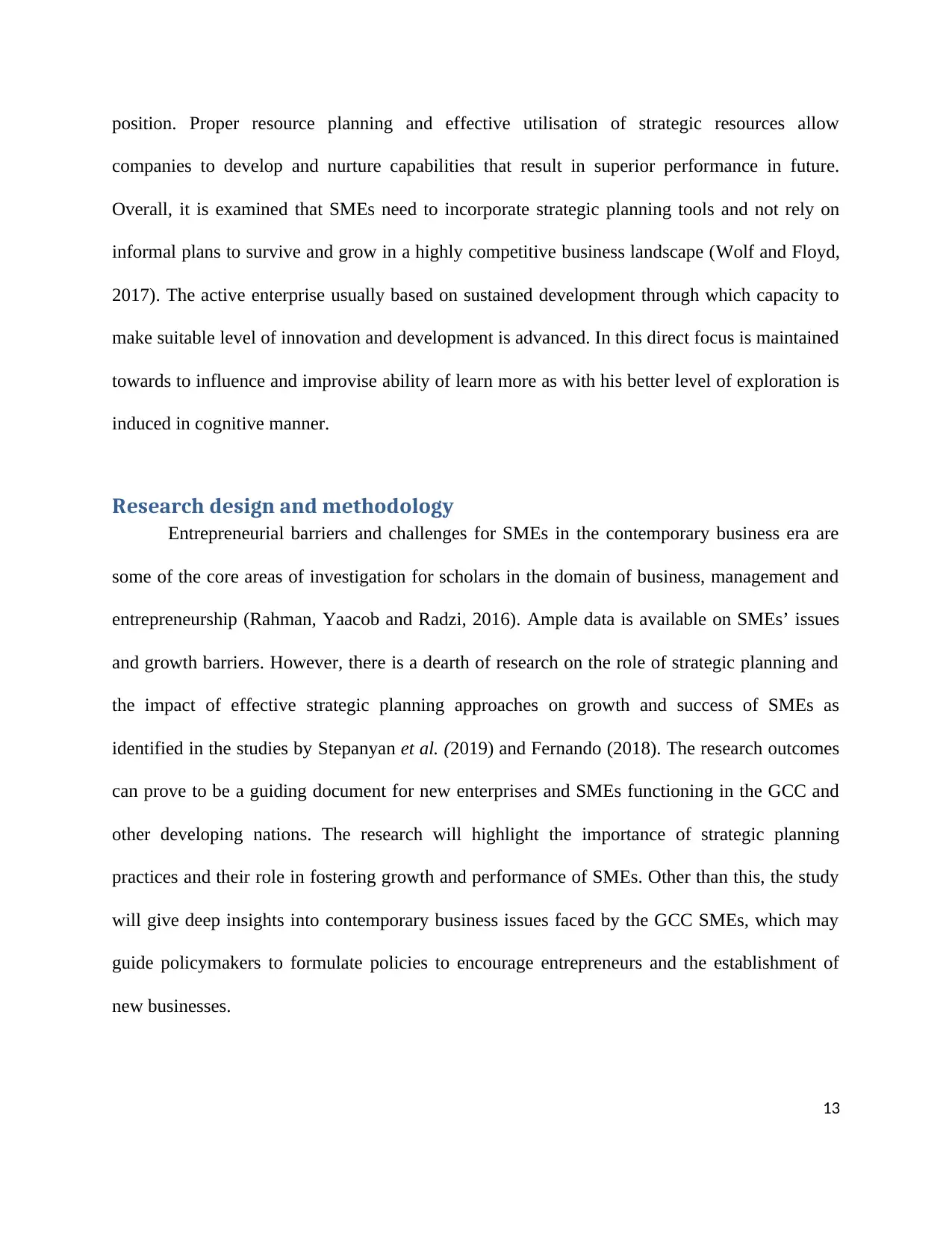
position. Proper resource planning and effective utilisation of strategic resources allow
companies to develop and nurture capabilities that result in superior performance in future.
Overall, it is examined that SMEs need to incorporate strategic planning tools and not rely on
informal plans to survive and grow in a highly competitive business landscape (Wolf and Floyd,
2017). The active enterprise usually based on sustained development through which capacity to
make suitable level of innovation and development is advanced. In this direct focus is maintained
towards to influence and improvise ability of learn more as with his better level of exploration is
induced in cognitive manner.
Research design and methodology
Entrepreneurial barriers and challenges for SMEs in the contemporary business era are
some of the core areas of investigation for scholars in the domain of business, management and
entrepreneurship (Rahman, Yaacob and Radzi, 2016). Ample data is available on SMEs’ issues
and growth barriers. However, there is a dearth of research on the role of strategic planning and
the impact of effective strategic planning approaches on growth and success of SMEs as
identified in the studies by Stepanyan et al. (2019) and Fernando (2018). The research outcomes
can prove to be a guiding document for new enterprises and SMEs functioning in the GCC and
other developing nations. The research will highlight the importance of strategic planning
practices and their role in fostering growth and performance of SMEs. Other than this, the study
will give deep insights into contemporary business issues faced by the GCC SMEs, which may
guide policymakers to formulate policies to encourage entrepreneurs and the establishment of
new businesses.
13
companies to develop and nurture capabilities that result in superior performance in future.
Overall, it is examined that SMEs need to incorporate strategic planning tools and not rely on
informal plans to survive and grow in a highly competitive business landscape (Wolf and Floyd,
2017). The active enterprise usually based on sustained development through which capacity to
make suitable level of innovation and development is advanced. In this direct focus is maintained
towards to influence and improvise ability of learn more as with his better level of exploration is
induced in cognitive manner.
Research design and methodology
Entrepreneurial barriers and challenges for SMEs in the contemporary business era are
some of the core areas of investigation for scholars in the domain of business, management and
entrepreneurship (Rahman, Yaacob and Radzi, 2016). Ample data is available on SMEs’ issues
and growth barriers. However, there is a dearth of research on the role of strategic planning and
the impact of effective strategic planning approaches on growth and success of SMEs as
identified in the studies by Stepanyan et al. (2019) and Fernando (2018). The research outcomes
can prove to be a guiding document for new enterprises and SMEs functioning in the GCC and
other developing nations. The research will highlight the importance of strategic planning
practices and their role in fostering growth and performance of SMEs. Other than this, the study
will give deep insights into contemporary business issues faced by the GCC SMEs, which may
guide policymakers to formulate policies to encourage entrepreneurs and the establishment of
new businesses.
13
Paraphrase This Document
Need a fresh take? Get an instant paraphrase of this document with our AI Paraphraser
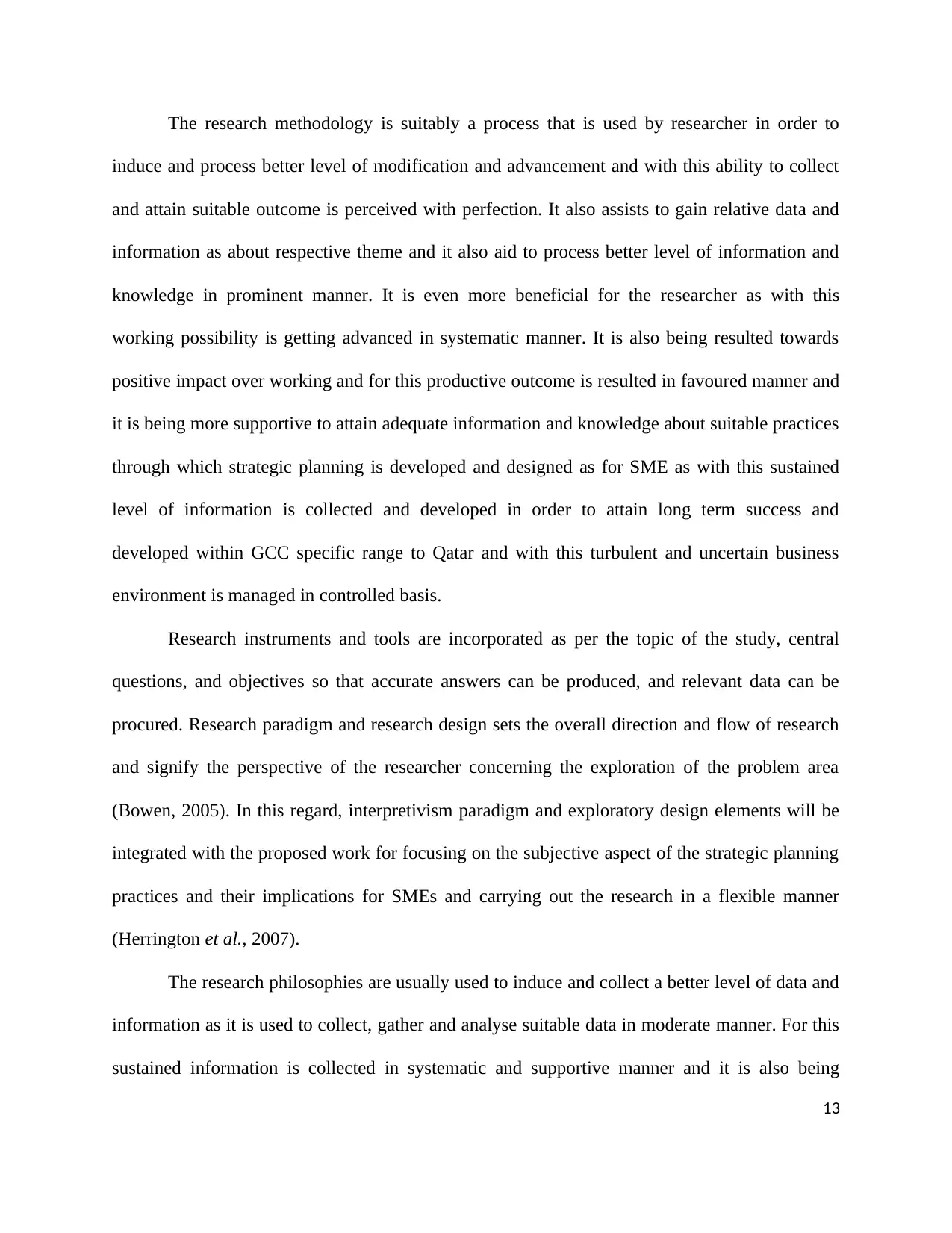
The research methodology is suitably a process that is used by researcher in order to
induce and process better level of modification and advancement and with this ability to collect
and attain suitable outcome is perceived with perfection. It also assists to gain relative data and
information as about respective theme and it also aid to process better level of information and
knowledge in prominent manner. It is even more beneficial for the researcher as with this
working possibility is getting advanced in systematic manner. It is also being resulted towards
positive impact over working and for this productive outcome is resulted in favoured manner and
it is being more supportive to attain adequate information and knowledge about suitable practices
through which strategic planning is developed and designed as for SME as with this sustained
level of information is collected and developed in order to attain long term success and
developed within GCC specific range to Qatar and with this turbulent and uncertain business
environment is managed in controlled basis.
Research instruments and tools are incorporated as per the topic of the study, central
questions, and objectives so that accurate answers can be produced, and relevant data can be
procured. Research paradigm and research design sets the overall direction and flow of research
and signify the perspective of the researcher concerning the exploration of the problem area
(Bowen, 2005). In this regard, interpretivism paradigm and exploratory design elements will be
integrated with the proposed work for focusing on the subjective aspect of the strategic planning
practices and their implications for SMEs and carrying out the research in a flexible manner
(Herrington et al., 2007).
The research philosophies are usually used to induce and collect a better level of data and
information as it is used to collect, gather and analyse suitable data in moderate manner. For this
sustained information is collected in systematic and supportive manner and it is also being
13
induce and process better level of modification and advancement and with this ability to collect
and attain suitable outcome is perceived with perfection. It also assists to gain relative data and
information as about respective theme and it also aid to process better level of information and
knowledge in prominent manner. It is even more beneficial for the researcher as with this
working possibility is getting advanced in systematic manner. It is also being resulted towards
positive impact over working and for this productive outcome is resulted in favoured manner and
it is being more supportive to attain adequate information and knowledge about suitable practices
through which strategic planning is developed and designed as for SME as with this sustained
level of information is collected and developed in order to attain long term success and
developed within GCC specific range to Qatar and with this turbulent and uncertain business
environment is managed in controlled basis.
Research instruments and tools are incorporated as per the topic of the study, central
questions, and objectives so that accurate answers can be produced, and relevant data can be
procured. Research paradigm and research design sets the overall direction and flow of research
and signify the perspective of the researcher concerning the exploration of the problem area
(Bowen, 2005). In this regard, interpretivism paradigm and exploratory design elements will be
integrated with the proposed work for focusing on the subjective aspect of the strategic planning
practices and their implications for SMEs and carrying out the research in a flexible manner
(Herrington et al., 2007).
The research philosophies are usually used to induce and collect a better level of data and
information as it is used to collect, gather and analyse suitable data in moderate manner. For this
sustained information is collected in systematic and supportive manner and it is also being
13
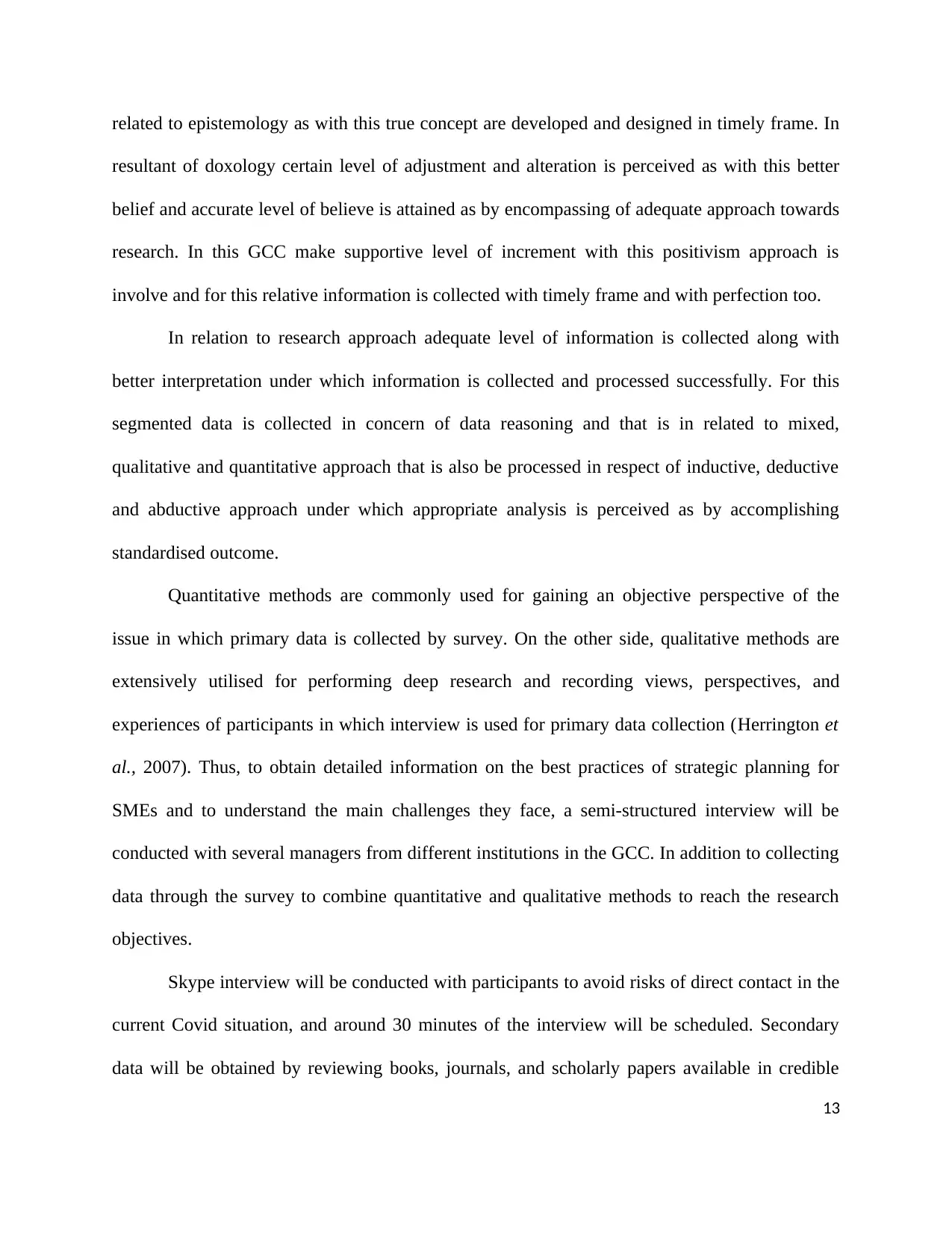
related to epistemology as with this true concept are developed and designed in timely frame. In
resultant of doxology certain level of adjustment and alteration is perceived as with this better
belief and accurate level of believe is attained as by encompassing of adequate approach towards
research. In this GCC make supportive level of increment with this positivism approach is
involve and for this relative information is collected with timely frame and with perfection too.
In relation to research approach adequate level of information is collected along with
better interpretation under which information is collected and processed successfully. For this
segmented data is collected in concern of data reasoning and that is in related to mixed,
qualitative and quantitative approach that is also be processed in respect of inductive, deductive
and abductive approach under which appropriate analysis is perceived as by accomplishing
standardised outcome.
Quantitative methods are commonly used for gaining an objective perspective of the
issue in which primary data is collected by survey. On the other side, qualitative methods are
extensively utilised for performing deep research and recording views, perspectives, and
experiences of participants in which interview is used for primary data collection (Herrington et
al., 2007). Thus, to obtain detailed information on the best practices of strategic planning for
SMEs and to understand the main challenges they face, a semi-structured interview will be
conducted with several managers from different institutions in the GCC. In addition to collecting
data through the survey to combine quantitative and qualitative methods to reach the research
objectives.
Skype interview will be conducted with participants to avoid risks of direct contact in the
current Covid situation, and around 30 minutes of the interview will be scheduled. Secondary
data will be obtained by reviewing books, journals, and scholarly papers available in credible
13
resultant of doxology certain level of adjustment and alteration is perceived as with this better
belief and accurate level of believe is attained as by encompassing of adequate approach towards
research. In this GCC make supportive level of increment with this positivism approach is
involve and for this relative information is collected with timely frame and with perfection too.
In relation to research approach adequate level of information is collected along with
better interpretation under which information is collected and processed successfully. For this
segmented data is collected in concern of data reasoning and that is in related to mixed,
qualitative and quantitative approach that is also be processed in respect of inductive, deductive
and abductive approach under which appropriate analysis is perceived as by accomplishing
standardised outcome.
Quantitative methods are commonly used for gaining an objective perspective of the
issue in which primary data is collected by survey. On the other side, qualitative methods are
extensively utilised for performing deep research and recording views, perspectives, and
experiences of participants in which interview is used for primary data collection (Herrington et
al., 2007). Thus, to obtain detailed information on the best practices of strategic planning for
SMEs and to understand the main challenges they face, a semi-structured interview will be
conducted with several managers from different institutions in the GCC. In addition to collecting
data through the survey to combine quantitative and qualitative methods to reach the research
objectives.
Skype interview will be conducted with participants to avoid risks of direct contact in the
current Covid situation, and around 30 minutes of the interview will be scheduled. Secondary
data will be obtained by reviewing books, journals, and scholarly papers available in credible
13
⊘ This is a preview!⊘
Do you want full access?
Subscribe today to unlock all pages.

Trusted by 1+ million students worldwide
1 out of 18
Your All-in-One AI-Powered Toolkit for Academic Success.
+13062052269
info@desklib.com
Available 24*7 on WhatsApp / Email
![[object Object]](/_next/static/media/star-bottom.7253800d.svg)
Unlock your academic potential
Copyright © 2020–2025 A2Z Services. All Rights Reserved. Developed and managed by ZUCOL.